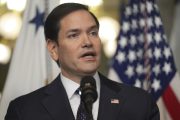
Pew Research recently polled Americans about ways to bring state budgets into balance and found that respondents did not like any of the options. In its Congressional Connection poll released June 28, Pew Research asked if a federal bailout of financially troubled states should be considered. Barely one in four said yes. Nearly 60 percent said no, that the states should take care of their problems on their own.
Other options offered by Pew included cutting transportation funding, raising taxes, cutting health services, reducing spending for police and fire departments, and slashing the public school budget. Each of those options was also strongly opposed, often by majorities approaching 70 percent. With chances of a double-dip recession increasing (explained here), and with economic recovery stalled, states will be increasingly hard-pressed to present popular solutions for getting their budgets under control.
Former Fed Chairman Alan Greenspan offered little encouragement when he criticized the financial reform bill, saying that if it’s passed in its present form it “will … eliminate lending” and further impede any kind of recovery from which the states might benefit. Economist Nouriel Roubini wrote that even if there is no double-dip recession, “growth [will be] so anemic that [it] will feel like a recession even if it’s not formally one.”
The National Bureau of Economic Research hasn’t yet declared an end to the recession, which started officially in December of 2007. Such a double-dip wouldn’t be unique in history, either, according to Professor Sung Won Sohn of California State University who believes that just such an event happened during the Great Depression. “As the U.S. economy was recovering in 1936 and 1937, it slid back into a recession as interest rates rose,” according to Nin-Hai Tseng writing for CNN. Mark Vitner, senior economist for Wells Fargo Securities, considers himself an optimist, but has just doubled his expectations for such an event in the near future. And Investors Business Daily just reminded its readers that the biggest tax increase in history will happen automatically on January 1, 2011, when the Bush tax cuts put in place in 2003 will be allowed to expire.
President Obama’s national debt commission also painted a gloomy picture when co-chairs Alan Simpson and Erskine Bowles told the National Governors Association that “everything needs to be considered — including curtailing popular tax breaks, such as the home mortgage deduction, and instituting a financial trigger mechanism for gaining Medicare coverage.” Bowles said that the nation’s debt “is like a cancer. It is truly going to destroy the country from within.”
Simpson expanded Bowles’ remarks: “The rest of the federal government, including fighting two wars, homeland security, education, art, culture, you name it, veterans, the whole rest of the discretionary budget, is being financed by China and other countries… Just think about that: all that money, going somewhere else, to create jobs and opportunity somewhere else.” Simpson added that the members of the commission are “good people of deep, deep difference[s], knowing the possibility of the odds of success are rather harrowing to say the least.”
Carly Fiorina, the Republican nominee for U.S. Senate in California, said that the United States could end up just like California if something isn’t done about federal spending. She said, “California is kind of a test case of what happens when government gets too big, spending gets too high, regulation get too thick, entitlements get too rich. We start destroying jobs and that’s what we are doing in California.” Fiorina focused on spending cuts as the best option: “Why is it that Washington, D.C. never gets to the point where they are talking about cutting spending?” she asked.
Other options in dealing with deficits and budget shortfalls, whether on the state or national level, include raising taxes, according to Pew Research. Peter Schiff, author of How an Economy Grows and Why it Crashes, notes that governments historically get themselves in trouble by spending more than they have. “Politicians make lots of promises to secure their elections and voters rarely consider the ability of taxpayers to actually foot the bills [when they come due],” he says. But cutting spending is more difficult, as noted in the Pew study, “because those whose benefits are cut are particularly apt to express their hostility both at the polls and on the street.”
Another alternative is for governments to default on the promises they made, either by telling their creditors that they cannot pay off their obligations, or by reducing promised benefits to the beneficiaries of state and federal largesse. Schiff points out: “The creation of ever greater quantities of debt has given us a [temporary] reprieve from the process of returning to living standards commensurate with our productivity. But at some point,” he adds, “we will have a very ugly encounter with our debt.”
And that is the primary flaw in the Pew Research study: leaving out the other inevitable options that will eventually have to be exercised if spending is not cut: defaulting on the states’ debts by rewriting the contracts, renegotiating the terms, rolling over old debt into new, or changing substantially the promises made. Most states have huge unfunded pension liabilities and substantial bonded indebtedness. Reducing those promised benefits, or rewriting the debt instruments to a level commensurate with the states’ reduced abilities to pay, wasn’t even considered in the Pew Research poll.
Modifying police and fire department expenses, reducing health services, cutting transportation budgets, and shrinking school budgets will all be painful, no doubt. But just wait until pensioners start seeing their benefits being cut, and bond holders see their interest earnings cut or eliminated altogether. At that point the pain of politicians’ promises not being kept will really, and inevitably, be felt. No one will be immune. It’s just a matter of time before reality kicks in.


